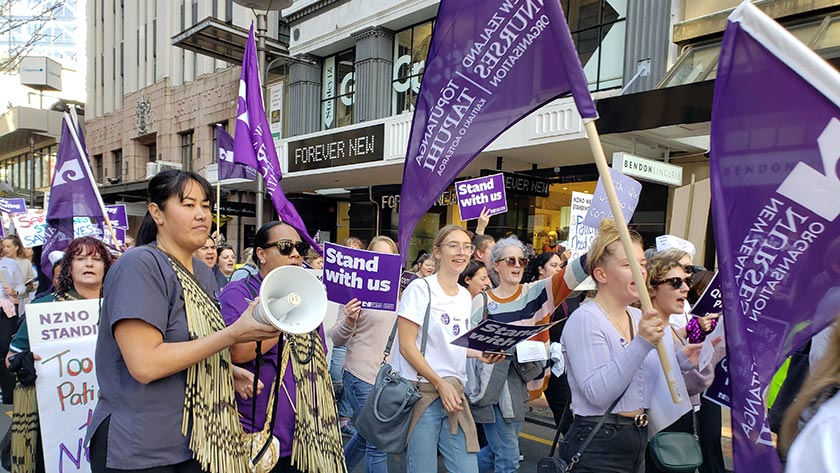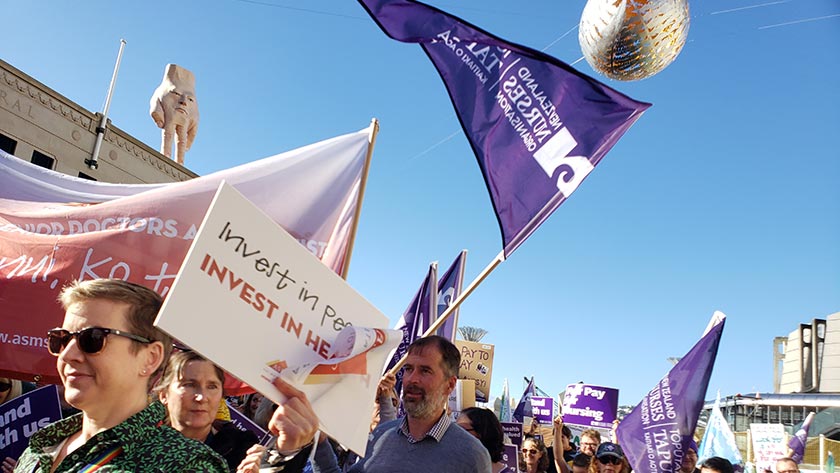NZNO district health board (DHB) members have voted in favour of three more strikes in a ballot that closed on July 6.
It came as the DHB bargaining team asked for a new meeting ahead of the schedule for a new round of mediation.
An initial 12-hour strike by members ran across Aotearoa on June 9. Health Minister Andrew Little fronted to members on the steps of Parliament.
The success of the strike, approved by an overwhelming majority, appeared to whet the appetite of members for further action.
A ballot of members saw three new strike dates set, running till September, in multi-employer contract agreement (MECA) negotiations.
NZNO lead advocate David Wait said the “yes” vote for the further strikes was very high.
Members were resolute about using the action to gain recognition and working conditions that would ensure nursing remained a viable profession, he said.
“This is an history-making set of actions that could take place over the next few months, but we will be continuing discussions with the DHBs… and we remain committed to securing a deal that is acceptable to our members.”
‘This is an history-making set of actions that could take place over the next few months.’
However there appeared to be a possibility that the DHBs seemed willing to “actively seek a solution”.
“Progress has been made in our discussions and that has given us some hope a resolution can be found around pay and safe staffing.”
The NZNO bargaining team was set for another round of mediation with representatives of the 20 DHBs on July 14 and 15. It was expected DHBs would make a new offer during this mediation.
However Wait said further discussions with the DHBs are set for later the same week of the ballot result – ahead of the scheduled mediation.
Wait said despite any optimism about bargaining progress, the issues facing nursing staff remained very real.
“We are facing a national health crisis in terms of safe staffing, recruitment and retention; and the working conditions our members face can no longer be endured and that’s why our issues matter.”
After the vote, Wait said he had not seen this level of determination from members before.

Wait said that if agreement was not reached, more nurses, midwives, health-care assistants and kaimahi hauora would leave nursing.
He said nursing was a “caring profession” and it was heart-breaking that nurses felt so undervalued.
Historic strike action looms as NZNO members send message to DHBs
Speaking in front of a purple wave at Parliament, during the first strike, Minister Little said he was committed to a pay rise and safer staffing for nurses, but made no new promises, pointing only to the Fair Pay negotiations which he suggested would conclude “in a matter of months”.
The health reforms, too, he said would make a difference to conditions in the long-term.
The strike, which ran with the necessary support of nurses who remained rostered on to provide life-preserving services (LPS), drew a generally positive response from the wider community.
The planned further industrial action would start with a 24-hour strike on July 29, running from 11am to 11am the following day.
The next strike would be on August 19 – running for eight hours from 11am.
The final strike approved in the latest ballot would run for 24 hours from 11am on September 9.
In each case, notice would be given ahead of the minimum 14 days’ notice required under law.
Immediately after the ballot results were announced, there appeared to be strong support for the action from members.
One registered nurse (RN) who worked for Capital & Coast DHB (CCDHB) at Wellington Hospital, who did not wish to be named, said she had been part of the 2018 industrial action.
There was a very different feeling this time round, she said, with nurses angrier and more determined.
For her, part of that was triggered by the DHB offer of a lump-sum payment that was simply an advance on a payment nurses would have received anyway.
Another RN who worked for CCDHB, and also did not wish to be named, said she had been in the 2018 action too.
She was “really happy” members had voted to go ahead with further strikes.
“From last time, I was one of the people who was disappointed we chose ‘yes’. I feel optimistic that everyone seems to be sticking to their guns this time.”
The last result made people more determined this time, she said.




